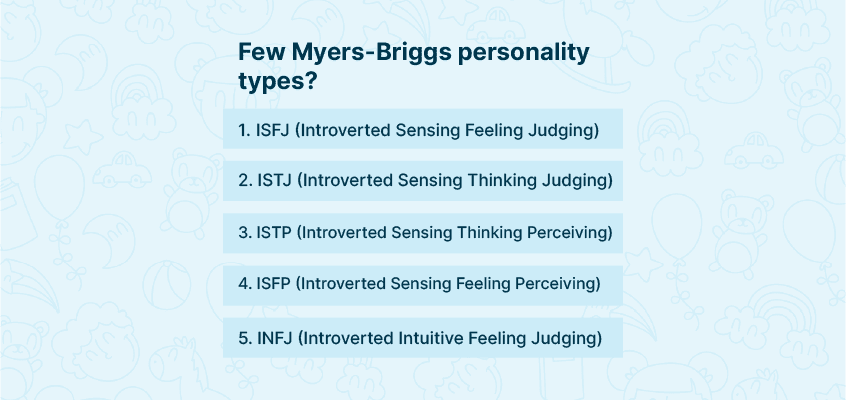Personality type is a way of describing and categorising personality traits. It is not a universally accepted professional or scientific category but rather an informal and utility-driven categorisation, which may be helpful for various purposes.
Our personalities play a huge factor in why we enjoy a particular type of work. Various factors contribute to our character – some may be genetic, while others may result from our upbringing.
Some personality traits by nature may favour one profession more than the other. For example, some enjoy the thrill of customer service; others like working on an assembly line because it is repetitive yet challenging.
So, you might ask yourself: “How does my personality reflect my profession?”
This question is important because the answer helps you better understand your personality and learn more about yourself. This article is for those who want to learn about the best professions based on their personality type.
What are 16 Myers-Briggs personality types?
Psychologists have thoroughly studied personality types and professions and published many results and conclusions. While there is no such thing as an accurate personality test that predicts future behaviour, there are ones that can illuminate your current behavioural patterns.
The Myers-Briggs Type Indicator is a method of determining one’s personality type based on four criteria: Extroversion (E) vs Introversion, Sensing (S) vs Intuition, Thinking (T) vs Feeling, and Judging (J) vs Perceiving.
According to the Myers-Briggs Foundation, there are 16 unique personality types in total, which fall into two categories: introverts and extroverts. 4 letters represent each of the 16 personality types. Each letter represents the four traits that make up your personality.
Let us learn more about these 16 personality types and professions that best suit them.
Our Wellness Programs
Looking for services related to this subject? Get in touch with these experts today!!
Experts

Banani Das Dhar

India
Wellness Expert
Experience: 7 years

Devika Gupta

India
Wellness Expert
Experience: 4 years

Trupti Rakesh valotia

India
Wellness Expert
Experience: 3 years

Sarvjeet Kumar Yadav

India
Wellness Expert
Experience: 15 years
Personality types and professions that best suit them
1. ISFJ (Introverted Sensing Feeling Judging)
ISFJ personality type people are generally quiet, cautious, and observant. They have a strong sense of duty and will strive to complete tasks even when they don’t want to do them. They make great caregivers, medical assistants, and teachers.
2. ISTJ (Introverted Sensing Thinking Judging)
While they tend to be traditional and loyal, these personalities want things done realistically and efficiently. These people like being in control of their environment, and they’re very responsible when it comes to completing their tasks. They make good doctors, lawyers, police officers, and military officers.
3. ISTP (Introverted Sensing Thinking Perceiving)
ISTP personality type is introverted, sensitive, and thoughtful. They are action-oriented people who love to be busy with projects, tools, and games. The ISTP personality type is creative, adaptable, and practical. They make sound engineers, mechanics, and forensic scientists.
4. ISFP (Introverted Sensing Feeling Perceiving)
The ISFP type is known as The Artist. ISFPs are creative and driven by their passions. They feel a great need to express themselves through art forms such as drawing, painting, sculpting, or music.
5. INFJ (Introverted Intuitive Feeling Judging)
INFJs are an uncommon personality type, making up less than 1% of the population. They are highly intuitive and value depth of character over surface-level interactions. As Diplomats, they have an inborn sense of idealism and morality, but what sets them apart is the accompanying Judging trait.
They make great advocates, artists, teachers, and counsellors.
6. INTJ (Introverted Intuitive Thinking Judging)
INTJs are deeply analytical people who can find themselves at home in science or math careers, such as engineering and computer programming.
7. INTP (Introverted Intuitive Thinking Perceiving)
The INTP personality type is the ultimate problem solver. People with this personality type are logical, creative, and open-minded. They are complex and reserved, yet they see things from multiple perspectives. INTPs make great engineers, scientists, strategic planners, etc.
8. INFP (Introverted Intuitive Feeling Perceiving)
INFPs are Idealists because they are perfectionists and have high standards. However, people may often perceive them as being impractical or too idealistic. Therefore, INFPs typically choose professions that deal with ideas, such as teaching and religion.
9. ENFJ (Extraverted Intuitive Feeling Judging)
ENFJs are known as the “Givers” and are the most people-focused type on the Myers-Briggs Test. Hence, they excel in careers that allow them to help or care for others. Teachers, counsellors, etc., are among the best career choices for ENFJs.
10. ESTP (Extraverted Sensing Thinking Perceiving)
ESTPs are very entrepreneurial. They are skilled at sizing up situations and devising strategic plans to achieve their goals. They are action-oriented individuals who love new experiences and challenges.
The best professions for this personality type include business professionals, marketing executives, analysts, and entrepreneurs.
11. ENTJ (Extraverted Intuitive Thinking Judging)
Often, one can describe an ENTJ as any company’s CEO. ENTJs are likely to charge ahead with their ideas and lead their subordinates by example. Some professions that may suit ENTJs are lawyer, entrepreneur, business analyst, and scientist.
12. ENTP (Extraverted Intuitive Thinking Perceiving)
ENTPs are often leaders. They are enthusiastic, outgoing, and charismatic. They love to be the centre of attention, but they easily interact with others. Their enthusiasm and new ideas can motivate both friends and family.
These traits make them excellent lawyers, salespeople, politicians, and teachers.
13. ENFP (Extraverted Intuitive Feeling Perceiving)
ENFP personalities are a special breed who love to learn and love change. They have a vivid imagination; they are constantly in love with the world and its possibilities. The best career matches for ENFP personalities are in sales, education, writing, counselling, and acting.
14. ESFJ (Extraverted Sensing Feeling Judging)
ESFJs are warm and friendly, and they enjoy being a part of groups. ESFJs tend to handle crises better since they focus on the positive. They enjoy being around people and have a large circle of friends.
Careers that are ideal for ESFJs include sales, customer service, nursing, teaching, and counselling.
15. ESFP (Extraverted Sensing Feeling Perceiving)
ESFPs are fun-loving people who love excitement. They love to be the centre of attention and are charming and charismatic, full of energy. They love being around people and will often play the part of the clown or entertainer just to entertain others.
ESFPs do best in careers where they can use their social solid communication skills, such as sales or teaching. They are also great with children.
16. ESTJ (Extraverted Sensing Thinking Judging)
ESTJ personality types are good at making decisions. They like to organise their lives and those of others. They are not afraid of conflict. They enjoy being in charge, but they can be very hard on themselves. Some possible career options for ESTJs include accounting, airline pilots, etc.
Wrapping up
Each personality type has its own unique set of strengths and weaknesses. To help you work with the best person for a particular task, we’ve listed some of the best professions to suit each character here.
No one is perfect, but this knowledge can help you compensate for your weaknesses. Use this information wisely to acquire these qualities to succeed in your relationships, career, and financial wealth.
Learn more at United We Care.



















